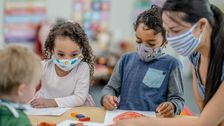News
What The New CDC Guidelines For Vaccinated People Mean For Parents And Kids
The Centers for Disease Control and Prevention released new safety recommendations on Monday for Americans who have been vaccinated against COVID-19. And for many, they offered some long-awaited good news.
The agency now says that individuals who are fully vaccinated ― meaning they have received both doses of a two-round vaccine and it’s been two weeks since the second dose, or they have received a single-dose vaccine and waited two weeks ― can gather indoors with others who have also been fully vaccinated, and they can do so without wearing masks.
They can also safely gather indoors with unvaccinated individuals from other households sans masks, as long as none of the unvaccinated people belong to a high-risk group. But what does this all mean for parents and children, most of whom don’t even have a vaccine available to them yet, and may not for months?
Here’s a quick breakdown.
Seeing grandparents
Perhaps the biggest news from the new guidelines as it pertains to families is that millions of grandparents and children have been given a green light to get together again. Age has been a big factor in determining vaccine eligibility across the country (although the majority of older adults in most states have still not received a single dose yet). And again, people who’ve been vaccinated can gather with unvaccinated individuals indoors without masks.
There are some exceptions, however.
Children who are unvaccinated (which is all children, at this point, since none of the available vaccines have been cleared yet for use in those under age 18), and who are at an increased risk of severe illness from COVID-19 because of an underlying health condition, should not gather with grandparents indoors without masks.
Nor should children who live with someone who is both unvaccinated and at higher risk.
Indoor play dates
The new CDC guidelines probably don’t change all that much on the play date front… for now. If both sets of parents or caregivers have been vaccinated, they can get together, unmasked and indoors, while their kiddos hang. (This is also OK to do if one adult has been vaccinated and the other hasn’t, as long as the unvaccinated person doesn’t have underlying conditions.) However, even if all the adults are vaccinated, it doesn’t make the play date any safer for the children, so make your decisions accordingly.
The CDC’s guidelines also hint at how quickly things could change once children are able to start receiving vaccines. (Pfizer has enrolled children as young as 12 in its ongoing research, and other manufacturers, including Moderna, Janssen and AstraZeneca, have all begun including children in trials. The American Academy of Pediatrics has said it expects studies will start including even younger children in the next few months.) Presumably, the same recommendations that govern adults’ behavior post-vaccination will also apply to children, which would mean they’d be able to spend time together indoors, unmasked.
For now, though, outdoors definitely remains the safer choice for kids who want to play together, and wearing a mask is as critical as ever.
School and camp
The new CDC guidelines strengthen the agency’s argument that schools can safely resume in-person learning, particularly as the Biden administration pushes states to get all teachers and other school and child care workers at least their first shots by the end of March. Once those educators and other staff have been fully vaccinated, they should be able to gather with others indoors.
However, the CDC also recommends that even fully vaccinated individuals take preventive measures (like wearing a mask and maintaining social distance) to stay safe when they’re in a crowded area, or one that is poorly ventilated.
Also, it’s important that everyone continues to watch out for signs of COVID-19 ― and if you experience any symptoms, you should get tested and then stay home. The agency noted that we are still learning how much the vaccines keep people from spreading the virus to others.
Looking forward
Aside from making it possible for many grandparents and grandchildren to be safely reunited, the new CDC guidelines don’t necessarily change very much for parents and children — for the time being. But it will be a different story once children are able to start rolling up their sleeves, and when more parents and caregivers are able to get vaccinated themselves. When adults get vaccinated, it helps provide some level of protection to children as well.
As the president of the AAP has said: “Widespread administration of the vaccine is a huge step toward returning to ‘normal,’ a time when we can safely visit, share meals, play together and hug our grandchildren. We talk about game-changers. The vaccine is a game-changer and we urge everyone who has the opportunity to get it to sign up now.”
Experts are still learning about COVID-19. The information in this story is what was known or available as of publication, but guidance can change as scientists discover more about the virus. Please check the Centers for Disease Control and Prevention for the most updated recommendations.
Read more

